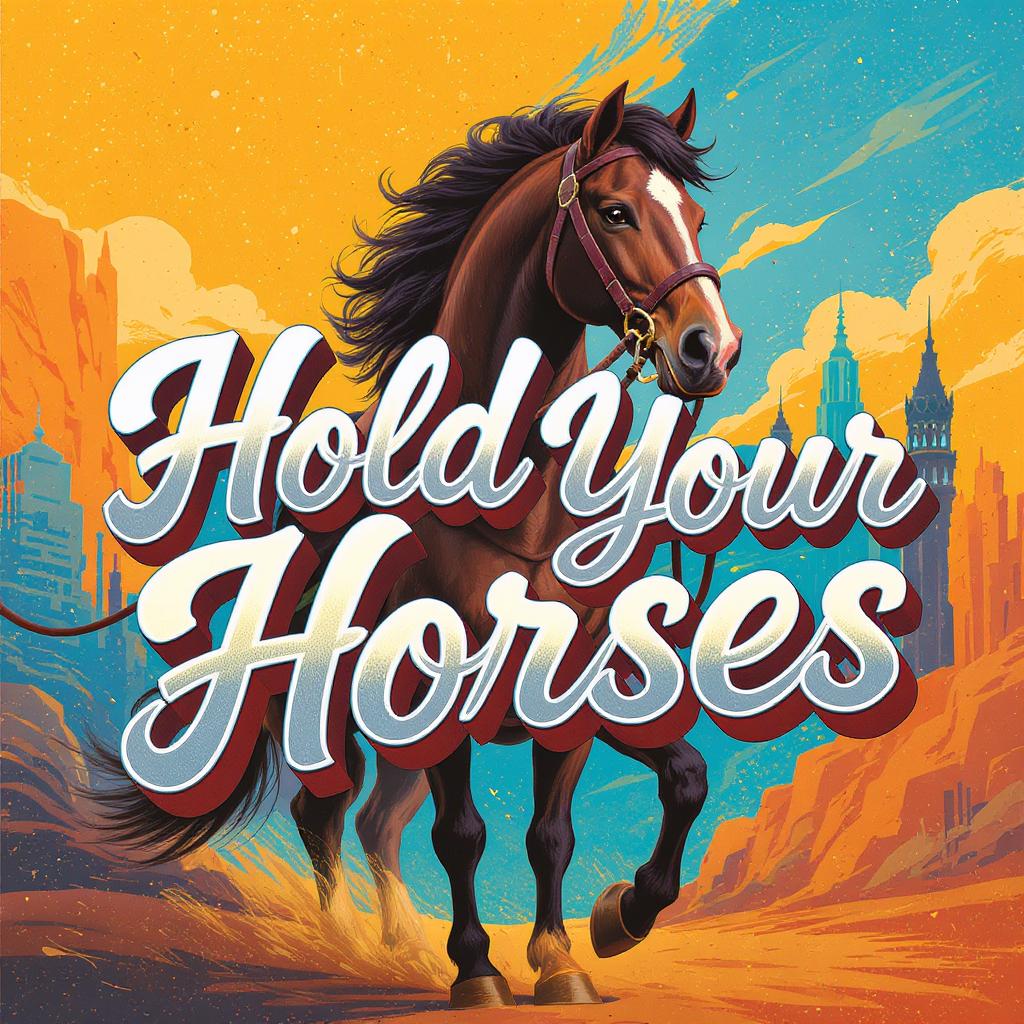Language is more than outstanding a device of terms—it indicates how we understand the location, specific our feelings, and hook up with those around us. Among the numerous strategies language gives depth and individuality to our conversation, idioms play a very precise and powerful function. These phrases, often rooted in history or way of life, offer super and extremely good strategies to the unique ordinary mind.
One such idiom that is nevertheless appreciably carried out in English is “Hold your horses.” While it might sound uncommon or preceding at the start, this phrase remains as a substitute relevant in current-day speech, presenting a colorful way to tell a person to be affected man or woman or sluggish down.
In this whole manual, we’ll take a look at the phrase “preserve your horses”—exploring its definition, historic ancient past, and real-life applications. Whether you’re learning English, enhancing your writing, or in reality curious about the origins of commonplace expressions, this newsletter will provide smooth insights subsidized via the use of linguistic experience and thoughtful evaluation.
What Does “Hold Your Horses” Really Mean?
A Clear and Practical Definition
The expression “maintain your horses” is a nice but employer way to tell someone to slow down, be affected man or woman, or pause earlier than making a decision. It’s usually used at the same time as a person is acting too short or unexpectedly—particularly in moments in which cautious concept or attention is needed in advance rather than taking motion.
Rather than being literal, this idiom is metaphorical. You’re no longer definitely asking someone to seize reins or save you actual horses. Instead, you’re encouraging them to prevent and assume in advance than intending, whether or not or no longer or not or now not they’re speakme, searching for some problem, or jumping to conclusions.
Other Common Ways to Say It

You won’t commonly pay interest the right phrase “keep your horses,” but the because of this is commonly expressed in amazing techniques which encompass:
- “Slow down a bit.”
- “Take a breather.”
- “Let’s not rush into this.”
- “Pause for a second and anticipate.”
- “Give it a second.”
These options deliver the identical concept of encouraging staying power and warning, especially at the same time as feelings or options are walking excessive.
Everyday Scenario
Let’s have a have a observe an actual-international state of affairs in which this idiom fits glaringly:
Person A: “I’m prepared to reserve this computer right now!”
Person B: “Hold your horses! Have you checked if it’s on sale everywhere else?”
In this situation, Person B isn’t looking to discourage the purchase—they simply want Person A to count carefully in advance rather than spending coins. The idiom works as a lighthearted reminder to be thoughtful and planned in place of speeding in.
Literal Meaning vs. Idiomatic Use of “Hold Your Horses”
Understanding the Literal Origin
The phrase “hold your horses” to start with had a very literal meaning. In instances at the same time as horses were the principal form of transportation—pulling wagons, carts, and carriages—drivers had to bodily preserve the reins to prevent the animals from moving in advance than it changed into everyday or appropriate to continue. This grows to be particularly crucial in crowded areas or in some unspecified time within the future of surprising stops, wherein letting the horses bypass too speedy a need to bring about accidents or confusion.
So, at the same time as someone said “maintain your horses” lower again then, it has ended up pretty literal: they have been telling someone to keep manipulating the horses till it became time to transport.
From Literal to Figurative: How the Idiom Evolved
As society moved in a protracted manner from using horses for adventure, the phrase didn’t disappear—it shifted proper proper proper right into a metaphor. Today, whilst we’re pronouncing “hold your horses,” we’re no longer talking about animals in the least bit.
Instead, we use it figuratively to invite someone to pause, wait, or reconsider earlier than appearing too short. The horses now represent our impulses—our rush to speak, decide, or act. So, telling a person to “hold their horses” is asking them to maintain their pride or urgency in check till the situation is more clean or the timing is higher.
Read More: 20 Idioms For Fun
The Historical Roots of “Hold Your Horses”
Ancient Foundations: Self-Control on Horseback
The concept in the back of “keep your horses” is going once more lots further than contemporary-day English. In reality, some linguistic students endorse the concept of restraining horses as a metaphor for staying power and manipulation dates all the manner to historical civilizations, which includes Greece and Rome.
In the early cultures, horses weren’t definitely animals—they had been critical to conflict, change, and everyday life. Riders needed to have specific management over their horses, mainly in excessive-stakes conditions like war or lengthy-distance tours. Even ancient literature suggests this mind-set. In Homer’s Iliad, there are references to holding returned horses—a tactic used by warriors to delay engagement or re-check methods earlier than entering into a combat.
This ancient context planted the seed for what would possibly ultimately become a well-known idiom about staying electricity and timing.
Gaining Popularity in 19th-Century America
Fast beforehand to the 1800s within the United States, and we start to see the idiom “keep your horses” input mainstream utilization. During the nineteenth century, horses were however a crucial part of life—used on farms, in transportation, and in military operations.
The word commenced appearing in regular conversations as a slight-hearted but clean manner to mention “wait a minute” or “don’t rush.” In reality, one of the earliest documented makes use of of the word can be traced to an 1844 edition of the New Orleans Picayune, which revealed the road:
“Oh, preserve your horses, Squire. There’s little need getting riled up.”
This easy sentence shows how the idiom ends up already getting used figuratively—as a way to tell a person to loosen up or gradual their response.
Influence of Soldiers, Cowboys, and Rural Culture
The idiom’s reputation didn’t save you there. As the U.S. The Civil War unfolded and the westward boom extended, more Americans—particularly soldiers and cowboys—depended on horses for their every day sporting sports. In those rugged, unpredictable environments, shouting “preserve your horses!” can be each a literal command (to avoid chance or keep control) and a figurative reminder to count on in advance than performing.
Military camps, frontier cities, and cattle drives all helped embed the word deeper into American English. Over time, it transitioned from a sensible command to an extensively recognized expression about restraint and staying power.
Contemporary Usage: How “Hold Your Horses” Remains Relevant Today

Although the word “keep your horses” lines lower yet again to a time at the same time as horses have been a number one part of each day’s existence, the idiom keeps thriving in current-day conversation. Its colourful imagery makes it a memorable and powerful expression, and it remains a not unusual way to set off staying strength, caution, or a brief pause in advance than movement.
Everyday Conversations
People regularly use this word in informal speech to slow a person down, whether or not or no longer or no longer or now not or now not or now not they’re speaking too speedy, leaping to conclusions, or speeding right proper proper right into a choice.
Examples:
- “Hold your horses—I haven’t even finished explaining.”
- “Let’s preserve our horses in advance rather than booking some aspects. We need to test the weather.”
These uses reflect how manifestly the phrase fits into every day language, even amongst more and more youthful audio gadgets.
Media and Entertainment
You’ll discover “keep your horses” frequently appearing in:
- TV sitcoms and dramas, particularly in comedic or own family scenes.
- Books and novels, in which characters communicate in casual tones.
- Editorials and columns, wherein writers use it to carry skepticism or propose warning.
- Podcasts and social media, specifically in lighthearted or opinion-based totally definitely sincerely content material cloth material.
- Its persevered use in storytelling and well-known way of life shows that idiomatic language stays relevant, even in digital codecs.
In Parenting
Parents frequently depend upon this word even when talking to youngsters who’re overly excited or impatient. Its fine, non-confrontational tone permits a calm scenario without sounding too stern.
Example:
- “Hold your horses, buddy. We’ll head to the park after lunch.”
The idiom works properly with more youthful audiences due to the reality its playful imagery is easy to understand, even for kids who’ve in no way visible a real horse.
In Business and Workplace Settings
Surprisingly, “keep your horses” is also utilized in professional environments, mainly at the same time as a person suggests developing a brief preference or change. It can feature a slight manner to signify slowing down and rethinking a way.
Examples:
- In conferences: “Before we approve the final numbers, allow’s maintain our horses and double-take a look at the facts.”
- In emails: “Let’s preserve our horses on launching the advertising and advertising and advertising and advertising and marketing marketing campaign till we get comments from the consumer.”
In the ones contexts, the phrase acts a balance amongst being assertive and approachable, making it a bendy part of every personal and expert vocabulary.
MCQs: “Hold Your Horses” Idiom
1. What is the primary meaning of the idiom “Hold your horses”?
A) Start taking immediate action
B) Take care of your animals
C) Be patient and wait before acting
D) Drive faster with urgency
✅ Correct Answer: C) Be patient and wait before acting
2. Where did the literal usage of “Hold your horses” originate from?
A) Modern digital communication
B) Horse racing culture of Australia
C) Ancient times when horses were used for transportation
D) Maritime navigation
✅ Correct Answer: C) Ancient times when horses were used for transportation
3. In what scenario is the phrase “Hold your horses” commonly used in parenting?
A) To discipline harshly
B) To stop kids from playing
C) To gently ask children to be patient
D) To command kids to clean up
✅ Correct Answer: C) To gently ask children to be patient
4. Which ancient literature contains a reference to holding back horses?
A) The Odyssey
B) Homer’s Iliad
C) The Republic
D) Aesop’s Fables
✅ Correct Answer: B) Homer’s Iliad
5. What do the “horses” in the idiom symbolically represent in modern usage?
A) Money and wealth
B) Excitement and impulsive actions
C) Transportation methods
D) Animals in general
✅ Correct Answer: B) Excitement and impulsive actions
6. What type of tone does “Hold your horses” typically convey in conversation?
A) Aggressive and serious
B) Calm and humorous
C) Formal and technical
D) Dull and indifferent
✅ Correct Answer: B) Calm and humorous
7. In which yr changed into one of the earliest published uses of the idiom recorded?
A) 1890
B) 1912
C) 1844
D) 1776
✅ Correct Answer: C) 1844
8. How is the phrase usually used inside the workplace?
A) As a manner to call for consequences
B) To recommend in opposition to procrastination
C) To inspire instant execution
D) To advise pausing earlier than making choices
✅ Correct Answer: D) To recommend pausing before making picks
9. Why has “Hold your horses” remained applicable in nowadays’s digital age?
A) Because it refers to fashionable vehicles
B) Due to its memorable imagery and flexibility
C) Because it’s far obligatory in writing exams
D) Since it’s far utilized in clinical papers
✅ Correct Answer: B) Due to its memorable imagery and versatility
10. Which of the subsequent is NOT a current version of “Hold your horses”?
A) Take a breather
B) Don’t rush
C) Gallop beforehand
D) Let’s now not rush into this
✅ Correct Answer: C) Gallop in advance
Final Words
Language evolves, but some expressions stand the test of time—and “Hold your horses” is certainly in truth clearly one in each of them. What started out as a literal command to manipulate real horses has grown to be a shiny and relatable metaphor for exercise, staying electric and thinking earlier than performing. Whether you’re coping with delight, navigating an immoderate-strain situation, or in fact reminding someone to slow down, this idiom remains an effective communique tool.
From historic battlefields to trendy boardrooms, the idea within the once more of “retaining your horses” continues to resonate in some unspecified time in the future of cultures and generations. It reminds us of the fee of energy of will in a brief-paced global—an easy but big word that encourages contemplated image earlier than response.
So subsequent times you enjoy the urge to act rapidly, whether or not or no longer or not or no longer or now not it’s far in verbal exchange, parenting, organization agency, or everyday life, recall this humble idiom. A quick pause, a considerate 2nd, a touch staying energy—that’s all it takes. Just maintain your horses.
Read More About Idioms At digital Reserved

